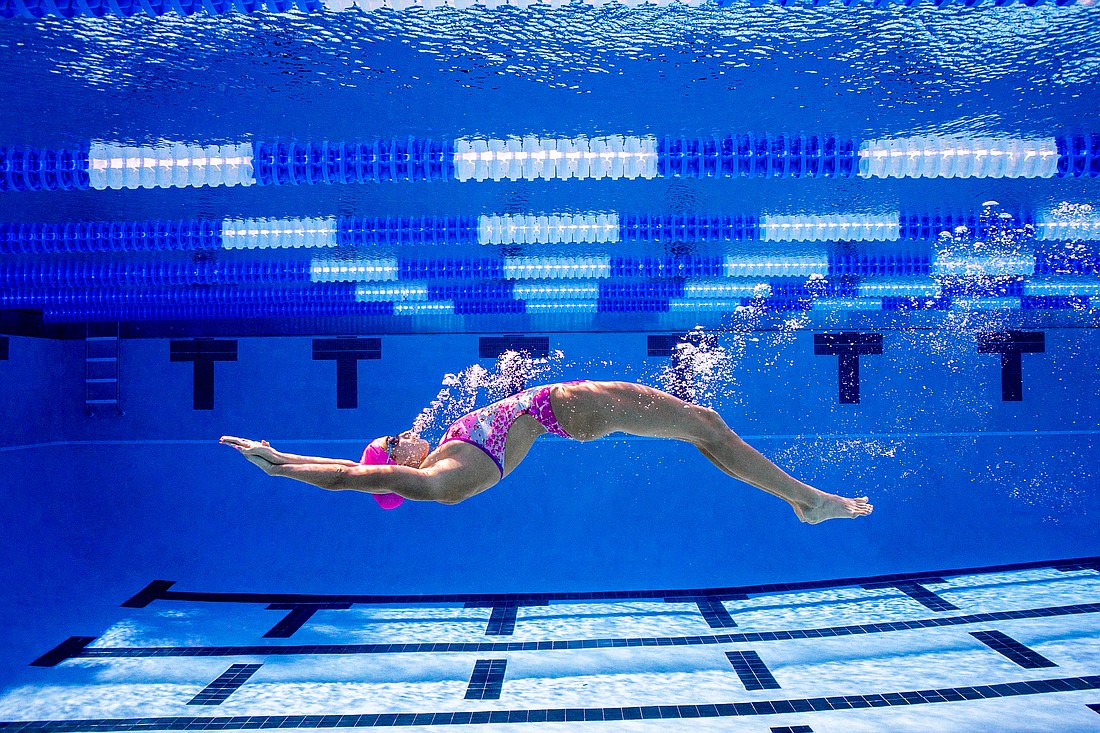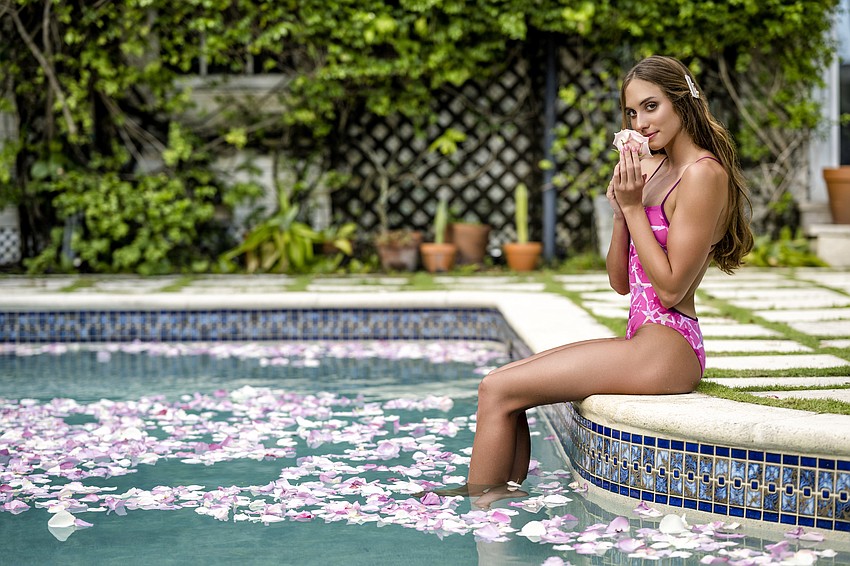- May 3, 2025
-
-
Loading

Loading

Who knew three letters could cause such a headache?
The NCAA has a problem with NIL — that's name, image and likeness rights — and the rules surrounding it. Since the NCAA changed its rules in 2021, allowing athletes to sign deals with any company not affiliated with their school, things have gone haywire, especially in revenue-earning sports.
Thankfully, one prominent local athlete is doing it right, setting an example for how these deals should work.
Emma Weyant, the former Riverview High and Sarasota Sharks star swimmer — not to mention an Olympic silver medalist — announced a collaboration with Sporti, a swimwear brand under the SwimOutlet umbrella, on Jan. 10. The Sporti x Emma Weyant Collection, as it is called on Sporti's website, features swimwear for women with various pink and blue patterns featuring flowers, butterflies, birds, sand dollars and other images. One-piece swimsuits are $48.95 while bikini tops and bottoms are $34.95 each.
A link to the collection's page is prominently featured on SwimOutlet's main page.
In the collaboration announcement, Weyant — who attends the University of Florida — said she wanted the collection to feel like self-belief.
"I wanted this collection to represent always believing in yourself," Weyant said in the announcement. "It’s always been a dream to be an Olympian since I was a little girl, but then progressing through the stages, that dream really turned into more of a goal. And with the support of my family and teammates, I realized that this dream could be real."

It is the type of NIL partnership that makes sense for a college athlete — especially an Olympian such as Weyant. Unlike college athletes in revenue sports like football and basketball, big-time athletes in Olympic sports will never receive much of a salary for what they do. There's no professional javelin league awaiting them, no rifle tour, no water polo showcase with an ESPN contract. For these athletes, their personal brand is all they have.
Sure, they get a bonus if they go come home from the Olympics with a medal, but that only goes so far and certainly does not apply to most of these athletes — Weyant just happens to be in the 1% of the sport's 1%. And even Weyant's silver-medal winning swim was a year and a half ago now. In an era where culture and trends move faster than ever, that's long time. There's no guarantee she'll have that kind of spotlight again (though I would not put it past her).
So good on Weyant for taking advantage of her brand while she still can, and in a way that makes sense. Attaching her name to a swimwear brand is a win-win; Sporti gets to use her image, and Weyant gets to be involved in something creative outside of the pool and expand her skillset. That, to me, is what an NIL deal should be: a cool opportunity, not a payment for play.
Weyant's announcement comes at a time when her school's football program is in the news for an NIL deal gone bad. According to reports from multiple outlets, but most prominently The Athletic, the Gators signed Jaden Rashada, a four-star quarterback from Pittsburgh, California, by working with the Gator Collective — a Florida Gators NIL group and fan club that is, importantly, not directly affiliated with the school — to give Rashada an NIL deal. The deal initially agreed upon in November, according to reports, was for an eye-popping $13 million. Since then, the deal has fallen apart, with the collective not having the money it promised Rashada, Rashada considering asking out of his letter of intent, and the collective coming back with a still-large counteroffer. As of Jan. 17, Rashada is still signed with the program, but that could change at any time. (Update: Rashada has now asked for a scholarship release.) The whole thing, to put it plainly, is a mess.
I highlight Rashada's deal not to put the Gators or Rashada on blast, but because deals like it are happening across the country, in football and basketball. Maybe not for $13 million, but for quite a bit of money. They are certainly legal if done through a fan collective, per the changes the NCAA made to its rules, but to me, they go against the spirit of what NIL should be.
I'm all for college athletes earning money for themselves. With all the time they put into not only their sports programs but their school work, they don't have time to get a job like other students. Yes, some of them get their education and room and board paid for, but that is hardly the same as having enough money to actually be a college kid, going out with their friends and having fun.
But the money they can earn shouldn't be used as a lure, with adult coaches and boosters reeling them out of the water on a hook. That's what the Rashada deal is. And it doesn't have to be that way. Alabama quarterback Bryce Young leveraged his talent and fame to get deals with Cash App, Onyx and other companies. Elite LSU gymnast and social media sensation Olivia Dunne has a deal with Vuori. And, in perhaps my favorite deal, wide receiver Decoldest Crawford, then enrolled at Nebraska, signed a deal with a local A/C company in 2022 and filmed a great commercial. Now that's brand synergy.
The Crawford deal in particular shows the power athletes can have when they market themselves. He wasn't a five-star player. He was an average recruit that sat out his freshman season with an injury and then transferred to Louisiana Tech. But he got paid all the same, and good on him for taking advantage of his opportunity.
As much as I think the pay-for-play model of NIL deals is bad for college sports, I also realize it's not going away, and also that players were being paid long before the NCAA's rules changed. It was just done in the shadows back then. You have to spend money to make money, after all, and goodness knows college athletics makes a ton of money for its schools. I don't write this column expecting to change anything, just to lament that there's a better way.
There's a possibility, far down the line, that the NCAA decides to treat student athletes as employees and lets schools sign players to deals directly — with regulations. I think that would be more fair to both teams and players than the current system, which is the Wild West. There would be no reneging on an NIL deal in that scenario, and the schools with the most money to spend, or the wealthiest boosters, would be limited in how that money was spread out.
But that is all speculation for the future. For now, there are pay-for-play deals, and there are deals that result in something everyone involved, including the general public, can benefit from. Emma Weyant's deal is a shining example of the latter.